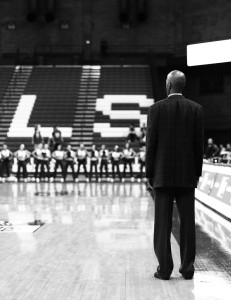Dealing with an Aggressive Parent

It is an unfortunate reality in basketball coaching that at some point in your career that you are more than likely going to have to deal with an Aggressive Parent. The problem with an aggressive parent is that they can be someone who has a personal connection to a coach or is well known to the coach, but for some reason becomes irate in a moment of high emotion. This can be a very confronting and challenging situation even for the most experienced coach to handle without losing their cool and having their own behaviour become unprofessional.
The potential when dealing with an aggressive parent for the situation to escalate and get out of hand is well documented on many news sites and articles published in courses. The main point these types of high profile stories convey is that an aggressive coach cannot deter an aggressive parent. This type of behaviour by the coach only leads to more people being in a poor state of mind and no one being in control of their emotions or thinking clearly. As a coach part of the Code of Conduct for becoming a basketball coach is to always act as a positive role model when dealing with anyone in your capacity as a basketball coach. A coach losing control of their emotions and becoming reckless with their actions does not uphold the ethos of what it is to be a basketball coach.
There are however and number of different strategies in dealing with an aggressive parent.
The first point in dealing with an aggressive parent is to always try and speak in a clear and calm voice. This is easier said than done, especially if the parent continues to talk over you. If this happens, simply pause and wait for the right moment to respond. If no moment presents itself then do not be worried about not having your say in the matter and at that moment. Often the parent will want to express their point and may not be looking for a resolution, but rather just to have their say and have you listen to them.
Also in connection to the use of the communication is to be mindful of your voice’s volume. Try to the volume of your voice to that of a normal conversation. This is because it will display a calm, controlled impression but it also has an additional benefit. When a person is involved in a discussion (heated or not) and the other person is speaking at a lower volume, the louder individual either reduces their volume to mimic the lower volume or becomes additionally attentive when the other party in the conversation speaks.
A coach when dealing with an aggressive parent should also be mindful of their body language. A coach should avoid waving their arms around, clenching their fists or point at the other person. These types of actions can be a sign of aggression and as earlier stated this is not the desired outcome in this situation. Using body language is fine, but a coach should be mindful of any actions that can appear to be condescending or belittling the parent.
Listening is important and can be the most effective strategy of all. Often an aggressive parent will want to communicate a problem or issue from their perspective. By having their points of view listened to and acknowledge this will often be the starting point for resolving the matter. This will also give an opportunity for a coach to identify what is the issue is the parent is so emotional about.
Finally, if ever faced with a situation where a parent becomes physically aggressive it is important to get out of the situation as soon as possible and try to find an administrator or person in authority to help manage the situation. This is obviously a very extreme and rare situation, but when faced with this scenario, backing away from the aggressor or asking them to please continue the conversation when you find a program representative are some of the options you have.
Aggressive parents are not that common within the sports scene. Unfortunately, through the publicised antics of a few in the media displaying this behaviour can be misinterpreted as a plague in proportions. If as a coach you are not comfortable speaking with an aggressive parent then use your programs support networks to help. Have a program official sit with you and the parent while discussing the point of contention. There is nothing wrong as a coach in having someone else (program official) help in the management of this issue and in using this tactic will often change the demeanour and behaviour of the parent by giving a different atmosphere to the conversation.







